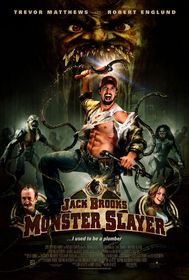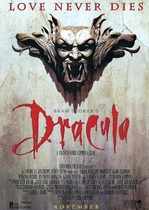Our editor-in-chief Nate Yapp is proud to have contributed to the new book Hidden Horror: A Celebration of 101 Underrated and Overlooked Fright Flicks, edited by Aaron Christensen. Another contributors include Anthony Timpone, B.J. Colangelo, Dave Alexander, Classic-Horror.com's own Robert C. Ring and John W. Bowen. Pick up a copy today from Amazon.com!
Trevor Matthews and Jon Knautz (Jack Brooks: Monster Slayer) interview
The horror-comedy Jack Brooks: Monster Slayer just wrapped up a three-city limited release in preparation for the DVD from Anchor Bay which hits shelves October 7th, 2008. The film, directed by Jon Knautz from a screenplay he co-wrote with John Ainsley, stars Trevor Matthews (who also has story and producer credits on the flick) as a plumber who must battle horrific beasties unwittingly unleashed by Professor Crowley (Robert Englund) upon a junior college. At Comic-Con this year, we had the opportunity to sit down with Matthews and Knautz (as well as the non-talkative composer Ryan Shore and producer Patrick White) and ask them about their wild and crazy film.
Classic-Horror: Who wants to tell me a little bit about what Jack Brooks: Monster Slayer is about?
Trevor Matthews: I don't think anyone wants to tell you anything about that.
C-H: Okay, who doesn't want to tell me but is going to anyway?
Matthews: Aaaaah, I guess I'll tell you about it, I guess. Jack Brooks is about an angry plumber who ends up becoming a monster slayer. Kind of a plumber who's dealing with these anger management problems... It's like an origin story. How a guy who is a world-traveling adventurer, a monster-slaying lunatic -- how did a guy become like that? So it's an origin story of a hero.
C-H: So you have sort of a comic book angle there – the idea of the origin story which leads to continuing adventures.
Matthews: Exactly.
C-H: I saw the panel and there seems to be an Evil Dead sort of influence. How important was it to incorporate the comedy and the horror in this first feature adventure?
Matthews: Was it? Were we trying to make a comedy? Stop laughing at our movie! I don't know... Jon, you want to take that?
Jon Knautz: It was always intended to definitely be a comedy. That sort of hybrid of horror-comedy has always been interesting to me. I think it's hit-and-miss sometimes. I think the difference is some don't seem to blend. Some of them are like slapstick comedy and then they go horror, but it's like they don't go far enough with the horror. The comedy, then, is sort of left hanging by itself. For me, personally, I watch some of them and I kinda go, “I don't know what this is...”
It was important for us that this was... Jack Brooks was supposed to be for horror fans and it's not taking itself too seriously. It's supposed to be fun and comedic at the same time. But when we went horror, we wanted to go as far as we could, so we would crush mutant heads in and [have] exploding bags of ooze. Give you the goods that I would've wanted when I was younger, watching those horror movies. You see somebody get their face smashed in and you're kinda like “Yah!” and you want more, so I was just trying to get that in there.
Matthews: That's sick, Jon. That's sick, man. You're sick.
Knautz: I know, I know.
C-H: Sick is good! We approve of sick.
Matthews: That's good!
C-H: Do you find that there's a relationship between the idea of the timing in a scene of suspense and comedic timing?
Knautz: Yeah. I think there's times where you can be funny and there's other times where you've got to... For me, when it really revved up to some of the action and horror, it was really focused on that, and when you'd come out of it there'd be a little comedic beat. The intent wasn't to have the characters flat-out winking at the audience and going, “This is a comedy.” It's funny because the characters are taking themselves and the situation very seriously, and I think that's where the humor comes in.
Matthews: Because it's guys who are taking themselves really really seriously, but they're acting off of a monster suit. Obviously, it can't take itself...
Knautz: It's situational humor. When Jack Brooks runs into a room and there's this big, fat f**king blob of a ridiculously grotesque practical effect monster and he's just like “oh man, what am I going to do? How am I gonna defeat this thing?” And he's taking it seriously.
C-H: Because he's really in danger.
Matthews: In serious danger.
Knautz: Yeah, but from an audience point of view, you're kinda going, this is funny... That was the intent.
C-H: Jack Brooks is obviously a character you're definitely positioning for a future series, continuing at least in some form, if not future sequels. Trevor, what's it like knowing you're going to possibly be continuing as this iconic figure in more films?
Matthews: Well, I think we just designed it in that way. It was this origin story of a hero. So, if we were to turn it into some kind of franchise, I think next go-around we would make a film about more of this iconic hero. Like, an actual monster slayer and now his worldly adventures, as opposed to the origin story.
I thought it was a really cool kind of storybook opening and ending [in the movie] – I was really excited when we came up with it. Because the story's there on its own, y'know – this plumber who's got this problem because his parents were killed. And then he deals with those problems by no longer running away from his fears and his nightmares, but actually confronting and attacking his worst nightmare, which is monsters, and finding his destiny in becoming a monster slayer. There's that story on its own. But when we tagged on this kind of a... He got addicted and he continued to do that. And that was like, he turned into something more like a... not a vigilante, but he turned into this ideal...
Knautz: Like Wolverine.
Matthews: Yeah, he turned into a bit of superhero almost. And I thought that was really cool, because it gave us this new twist where we could open the film without showing his face and we could open the film with him as an older...
Knautz: And I think the thing is that Jack Brooks really represents humans fighting monsters, because he doesn't have any superpowers. You get these monsters that show up that can do superhuman things. Jack Brooks doesn't, he's just... He's like Batman.
C-H: He's not the Chosen One, he's not half-monster, he's just a guy.
Knautz: He doesn't have a special skill. His only thing is that he's really pissed off, so he learns to channel that anger towards monster slaying.
C-H: It's interesting that you mention Batman, with the two parents killed in the childhood. Was that conscious?
Knautz: No, no. That one was... I can assure you, I never even thought about it until now. I did definitely think... I love Batman, because he doesn't have superpowers. He's a guy, who's out there...
C-H: With millions of billions of dollars.
Knautz: That helps. So that was definitely a bit of an influence, for sure. But I never actually thought about his parents died, too, so that's... That's interesting.
C-H: You mentioned the practical effects. Was that important, that the monsters be represented in practical prosthetics and appliances?
Knautz: Yeah. I guess in a way the film was almost approached a little selfishly, in the sense that it was like, what would we want to see in this kind of a movie? You know, thinking of what we would hope the demographic, the lovers of the genre would want to see. I just thought of myself growing up with the films of the 80s and seeing that transition into, “Oh, we've got CGI now!” I think CGI, as long as it's used as a tool, like any piece of equipment on a film shoot, can be used really well. There's times you gotta do it. But generally speaking, I'm not scared or threatened by computer-generated monsters, even if the practical ones look kind of corny. There's just something... The audience reacts differently, because they know it's right there and that somebody designed it, created it.
From a director's point of view, it's cool, because it teaches you more creative ways to execute the effects. We have these tentacles slithering around hallways, grabbing people. For me, it was really fun, because it was like, “Okay, cool, so I gotta do this with reverse photography. How can I make this work?” So there are some shots that are reversed, some are forward, some are like a mixture of both, you know what I mean? Sometimes Trevor would actually have to act in reverse, y'know, Bruce Campbell stuff. And it's just fun to direct stuff like that and I think, rather than going, “Well, we'll figure it out in post with all the CGI,” it's more of a challenge to do it this way. Again I just feel if we were to bring CGI into this movie, it just suddenly wouldn't be the homage to the 80s horror films we were trying to pay tribute to.
C-H: Bringing something real into the experience. And that follows into way you guys handled the musical score. [In the panel at Comic-Con, they talked about how the film had a full orchestral score, rather than one performed on a synthesizer]
Knautz: Exactly.
C-H: How would you describe the score? Is there a comparison that we'd be familiar with or does it come from a completely new sort of place?
Knautz: Obviously in the 80s there were synthesizers and stuff – I'm just thinking of the scores I heard in the 80s that are just classic now that were just electric guitars when a bad guy comes out. But this was more like... We were trying to give birth to this gladiator-type character that is sort of born by the end of the film. So when we did the edit, we laid over a temp score obviously just for energy purposes and finding the right kind of... We just sort of gravitated towards Batman Begins and Braveheart and those kind of epic sort of...
C-H: Larger sounds.
Matthews: I think at first it was almost a bit of a joke. I remember coming into the editing room and you were like, “Check this out.” And it was too big. It was so big that we laughed. But the thing is, it worked and we got a bit addicted to it, almost. Like we wanted something that was that big, actually.
Knautz: And I was glad, because the kind of movie that Jack Brooks is, it allows for that. Because it's horror-comedy, when this epic score comes in, it works! Like, it's fun. You're almost laughing at the fact it's so epic and large. Because the movie's sort of tongue-in-cheek and not taking itself so seriously, I think it kind of works. Whereas, I think if we were really taking ourselves seriously and this orchestra came in, people would be going like, “LOSERS!”
Classic-Horror.com would like to thank the creative minds behind Jack Brooks: Monster Slayer for taking the time to talk to us about their film. The movie is out on DVD on October 7th, 2008.








